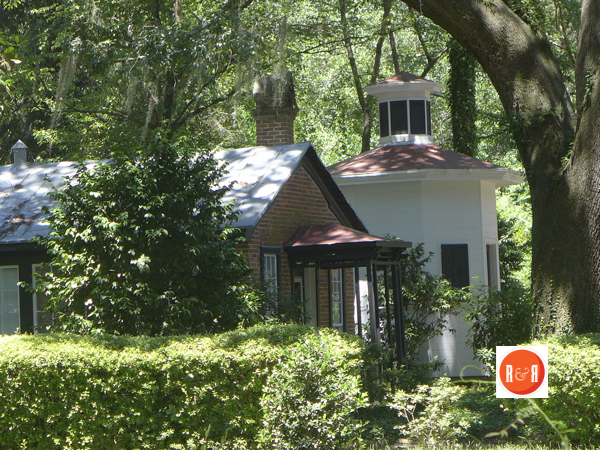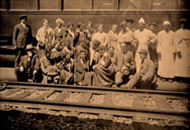City Directories and History: Identified as the home White Gables in 1979. White Gables – (603 West Richardson Avenue) ca. 1830s, two stories. Clapboard and masonry. Tin medium gable roof with three pedimented dormers. 2 story, five bay portico across front facade. 6 square pillars on ground floor; 6 slender unfluted columns with balustrade on 2nd. 1st and 2nd floor entrance ways have transom and sidelights. Four 6/6 windows with louvered shutters on both floors. Metal window sills on first floor. Private residence, once used as resort inn.

Photo contributed to R&R by Gazie Nagle @ www.fineartbygazie.com
Summerville originated as a pineland summer refuge for low country planters. Originally the
streets were laid out without any plan and winding roads still characterize the oldest section of town. This “old town” lies in the southwestern portion of the historic district and contains about two thirds of the land and half the structures of the district. The South Carolina Canal and Railroad Company laid out the more regular “new town” in 1832. Streets run parallel and at right angles to the track laid in 1830-1831. The “old town” and that portion of the “new town” were incorporated into the village of Summerville in 1847. Following the Civil War, wealthy northerners began wintering there. The town’s designation in 1887 as a health spot gave it an impetus as a resort, which was not lost until the Depression of the 1930s. There are approximately seven hundred structures within the nominated area; about 70% predate World War I. Uniting the different building styles of the town is a common sensitivity to the natural setting and to the local landscaping traditions reflected in streetscapes, parks and gardens. Raised cottages, Greek Revival influenced, and Victorian/Queen Anne and other turn of the century structures are found throughout. Antebellum buildings are principally located in the southern and western areas. Churches are located in the center of the district, and the commercial buildings—most dating from around 1900—are located on either side of the town square in front of the present town hall, which faces the railroad. Additionally, Summerville has been the center for azalea culture and there is a variety of azaleas popularly named “The Pride of Summerville.” Listed in the National Register May 19, 1976.
View a map showing the boundaries of the Summerville Historic District. View the complete text of the nomination form for this National Register property.
Stay Connected
Explore history, houses, and stories across S.C. Your membership provides you with updates on regional topics, information on historic research, preservation, and monthly feature articles. But remember R&R wants to hear from you and assist in preserving your own family genealogy and memorabilia.
Visit the Southern Queries – Forum to receive assistance in answering questions, discuss genealogy, and enjoy exploring preservation topics with other members. Also listed are several history and genealogical researchers for hire.
User comments welcome — post at the bottom of this page.
Please enjoy this structure and all those listed in Roots and Recall. But remember each is private property. So view them from a distance or from a public area such as the sidewalk or public road.
Do you have information to share and preserve? Family, school, church, or other older photos and stories are welcome. Send them digitally through the “Share Your Story” link, so they too might be posted on Roots and Recall.
Thanks!


